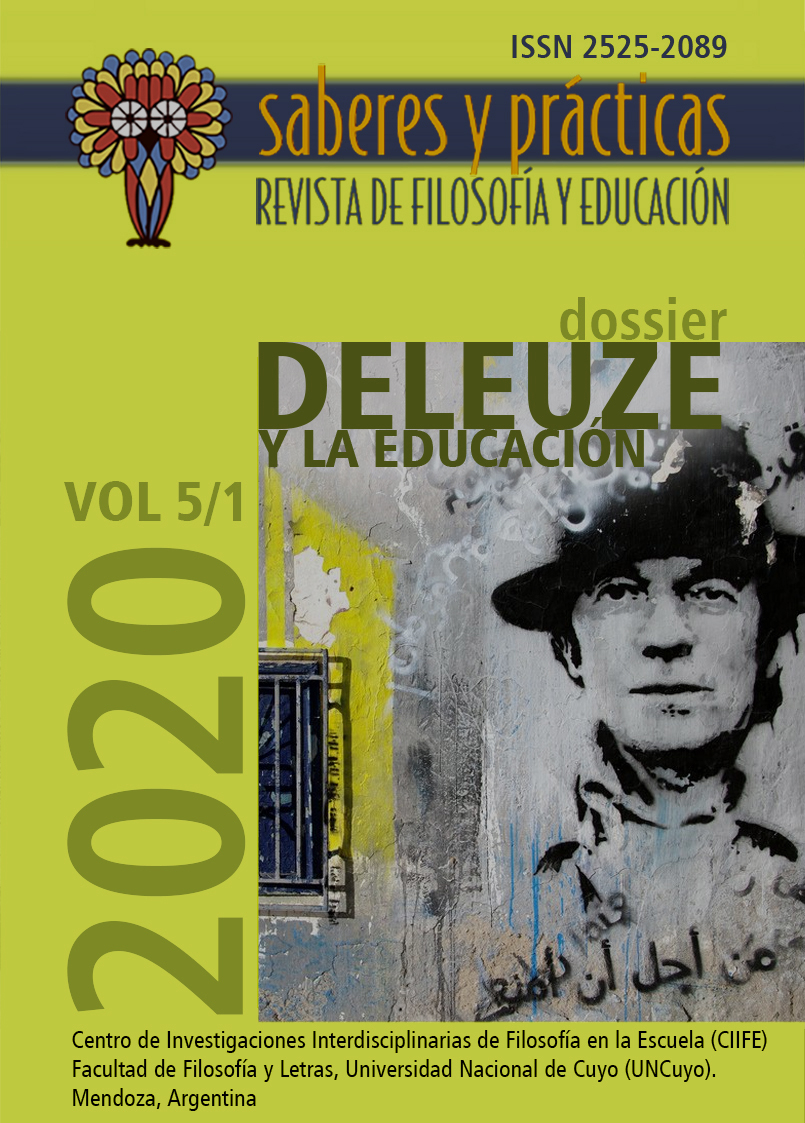Paisajear: a cartographic methodology to persue the educations (others) produced inside a factory
Keywords:
Cartographic investigation, Errancy, Movements, Paisajear, Education (others)Abstract
This paper follows the process of epistemological conceptualization and creation-experimentation developed in the investigation Cartographies of an education (others). The purposes of this investigation were focused on map the educative happening in the spatial, temporal and body folds of a factory that makes materials for education located in Medellin. This methodical process was called paisajear, a concept around which we articulate a series of actions focused on create geographic and existential landscapes. The results of its application allude to the configuration of a map of the educational that speaks of the way the bodies make presence in that territory. A movement that wraps bodies over themselves is highlighted, as well as another that wraps bodies and machines in a symbiotic expansion. We also perceive movements that expanded themselves, on the one hand, from the factory to geographical locations: the house, the children's school, and the health center; and on the other, towards existential places: fragments of past experience, obligations with the family group and illusions around the realization of some own project.
Downloads
References
Bal, M. (2009). Conceptos viajeros en las humanidades. Una guía de viaje. Murcia: CENDEAC.
Bergson, H. (1948). La evolución creadora. En: Henri Bergson: Obras Escogidas. Traducción y prólogo de José Antonio Miguez. Aguilar. Consultado en noviembre de 2018. http://bit.ly/2AMo5DY
Clarke, B; Parsons, J. (octubre de 2013). Becoming Rhizome Researchers. Reconceptualizing Educational Research Methodology, Oslo: Escuela Superior de Oslo, v. 4 (7), p. 35-43. Consultado en octubre de 2018. https://doi.org/10.7577/rerm.685
De Certeau, M. (2000). La invención de lo cotidiano. I Artes de hacer. Primera reimpresión. México: Universidad Iberoamericana, Instituto Tecnológico y de Estudios Superiores de Occidente.
Deleuze, G. (2007). Dos regímenes de locos. Textos y entrevistas (1975- 1995). Valencia: Pre-textos.
Deleuze, G. (2015). La subjetivación: curso sobre Foucault III. Buenos Aires: Cactus.
Deleuze, G. & Guattari, F. (1997). ¿Qué es Filosofía? Traducción de Thomas Kauf. Barcelona: Anagrama. Consultado en octubre de 2018. https://bit.ly/39v5wmF
Deleuze, G; Guattari, F. (2009). Mil mesetas. Capitalismo y esquizofrenia. Valencia: Pre-Textos.
Deligny, F. (2015). Lo arácnido y otros textos. Buenos Aires: Cactus.
Farina, C. (septiembre de 2006). Arte, cuerpo y subjetividad. Experiencia estética y pedagógica. Educación Física y Ciencia, La Plata: Universidad Nacional de La Plata, v. 8, p. 51-61. Consultado en octubre de 2018. https://bit.ly/2TuBdHm
Guattari, F. (1995). Cartografías del deseo. Compilación y prólogo de Gregorio Kaminsky. Buenos Aires: La Marca.
Guattari, F. (2000). Cartografías Esquizoanalíticas. Buenos Aires: Manantial.
Guattari, F. & Rolnik, S. (2006). Micropolítica. Cartografías del deseo. Madrid: Traficantes de Sueños.
Hernández, F. (diciembre de 2008). La investigación basada en las artes. Propuestas para repensar la investigación en educación. Educatio Siglo XXI, Murcia: Universidad de Murcia, v. 26, pp. 85-118, dic. 2008. Consultado en septiembre de 2018. https://bit.ly/2uYDnFF
Kastrup, V; Passos, E. (2009). Cartografiar é acompanhar processos. En: Pista del método cartográfico, pesquisa intervencao e producão de subjetividade. Porto Alegre: Sulina.
Kastrup, V. (2009). O funcionamento da atenção no trabalho do cartógrafo. En: Pista del método cartográfico, pesquisa intervencao e producão de subjetividade. Porto Alegre: Sulina, 2009.
Mancy, D. (Junio de 2015). Problematizing qualitative educational research: reading observations and interviews through rhizoanalysis and multiple literacies, Reconceptualizing Educational Research Methodology, Oslo: Escuela Superior de Oslo, v. 6 (1), p. 1-14. Consultado en octubre de 2018. https://doi.org/10.7577/rerm.1422
Nehamas, A. (2002) Nietzsche. La vida como literatura. México: Fondo de Cultura Económica.
Nietzsche, F. (1984). Así habló Zarathustra. Madrid: Euroliber.
Nietzsche, F. (2017). Ecce Homo. Cómo se llega a ser lo que se es. Madrid: Alianza.
Ospina, T., Hernández, E., Farina, C. (2019). Afecciones corporales en una planta de producción de materiales educativos. Revista da FAEEBA - Educação e Contemporaneidade. Capa, v. 28, n. 56. págs. 179-192. Consultado en junio de 2018. https://cutt.ly/kiGfrNe
Rolnik, S. (1989). Cartografia Sentimental, Transformações contemporâneas do desejo. São Paulo: Editora Estação Liberdade. Consultado en septiembre de 2018. https://cutt.ly/MiGfmhS
Sánchez, F. (2018). El cuerpo desfigurado. Revista Arcadia, edición número158. Consultado en noviembre de 2018. https://bit.ly/3ch3jgF
Zambrano, M. (1986). Claros del Bosque. Barcelona: Seix Barral.
Published
How to Cite
Issue
Section
License

This work is licensed under a Creative Commons Attribution-NonCommercial-ShareAlike 2.5 Argentina License.





















